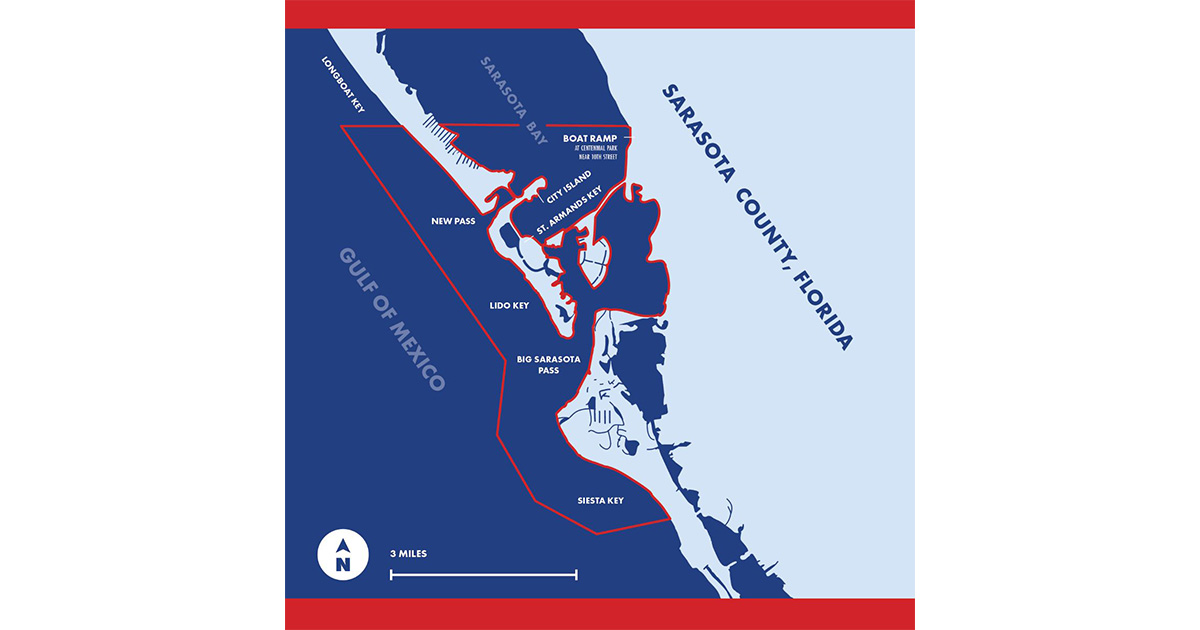Its main focus is to protect sea turtles from unintended boat strikes. The Sea Turtle Protection Zone initiative was created in 2021 through a partnership between the Loggerhead Marinelife Center and the Archie Carr Center for Sea Turtle Research at the University of Florida.
Mote Marine Laboratory scientists documented boat-strike hotspots in local waters and mapped the voluntary Sea Turtle Protection Zone for this area. The zone stretches from Longboat Key to Siesta Key, including Sarasota Bay, and extends from shore to 1.5 miles offshore.
“We’re excited to partner with the community to help protect sea turtles in the areas where we see the most animals struck by boats,” said Gretchen Lovewell, Mote’s Stranding Investigations Program Manager. “By closely monitoring for changes in stranding numbers and boater speeds, we hope to expand the zone and our monitoring efforts to all hot spot areas in the county.”
Sea turtles are threatened and endangered species found year-round in southwest Florida waters. During nesting season, sea turtles spend more time closer to the surface and close to their nesting beaches. With more turtles near the surface, there’s a greater chance that a boat might strike one by mistake. Many of the grass flats in the area are prime foraging grounds for sea turtles, which also puts them at risk for boat strikes. The good news is, boaters can protect sea turtles by slowing down and using vigilance in key locations.
“Since the 1980s, sea turtle vessel strikes have tripled in Florida and unfortunately more than 90% of sea turtles with definitive boat strike injuries have resulted in fatalities,” said Valerie Nicole Tovar, Conservation Manager at Loggerhead Marinelife Center. “Our goal with the STPZ is to increase boater awareness and enlist boater voluntary compliance to decrease sea turtle injuries and deaths by creating a united front with our local boating communities. The STPZ has served as a vital tool for sea turtle conservation in Palm Beach County and will continue to do so in Sarasota.”
The project is funded by the Archie Carr Center for Sea Turtle Research with funds from Disney Conservation Fund and in part by a grant awarded from the Sea Turtle Grants Program. The Sea Turtle Grants Program is funded by proceeds from the sale of the Florida Sea Turtle License Plate.
“The Archie Carr Center for Sea Turtle Research at the University of Florida is excited to collaborate with and support the Mote Marine Laboratory with funds from the Disney Conservation Fund to reduce vessel strikes to sea turtles in their coastal waters,” said Dr. Cathi Campbell, Adjunct Assistant Scientist for Archie Carr Center for Sea Turtle Research. “We began a partnership with Loggerhead Marinelife Center a few years ago to address this threat in the Juno Beach area and with their guidance are expanding the Sea Turtle Protection Zone to partner with Mote Marine Laboratory. Educating the boating community about this threat and asking for their help is vital to decreasing unintentional boat strikes on sea turtles. Working together, we can enjoy our coastal areas and help maintain healthy sea turtle populations here in Florida.”
Hot Spots for boat-struck sea turtles are Longboat Pass, New Pass, Big Pass, Siesta Key, Venice Inlet, and offshore two miles north of New Pass to two miles south of Big Pass extending out one and a half miles; limit travel time within these Hot Spots and travel at a minimum safe speed when in these areas. Enjoy coastal waters and help sea turtles by making sure you Go Slow for Those Below!
To report distressed, injured, or deceased sea turtles, manatees, dolphins or whales in the Sarasota/Manatee area call our strandings hotline at 888-345-2335. For locations elsewhere in Florida, contact the Florida Fish and Wildlife Conservation Commission: 888-404-3922.
Boaters, here's how you can help turtles:
- Go slow: Follow Coast Guard-approved safe boating guidelines. Go as slow as safely possible in areas bounded by red lines—the voluntary Sea Turtle Protection Zone—and limit your travel time in these areas. Follow any posted speed-zone signs—it’s required by law.
- Wear polarized sunglasses to see and avoid sea turtles in your path, and ask one of your passengers to be the designated wildlife spotter.
- Report stranded sea turtles (as well as stranded marine mammals) in Sarasota & Manatee counties to Mote at 888-345-2335. Elsewhere in Florida, contact the Florida Fish and Wildlife Conservation Commission: 888-404-3922.
- Stow trash: Be sure to stow trash and line when under way. Marine debris that accidentally blows overboard or out of a vehicle can become ingested by or entangled around marine life.
- Keep the water trash free: Never discard trash in the water.



